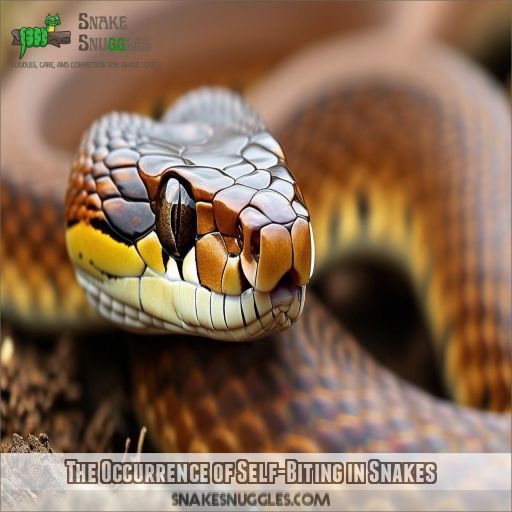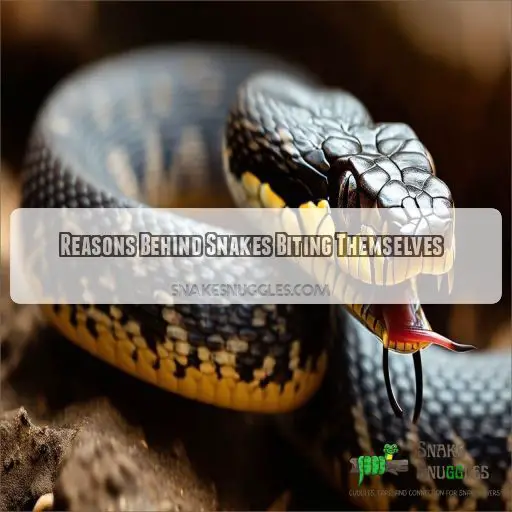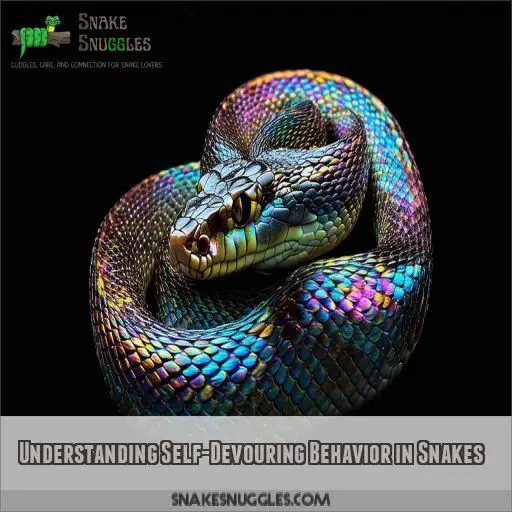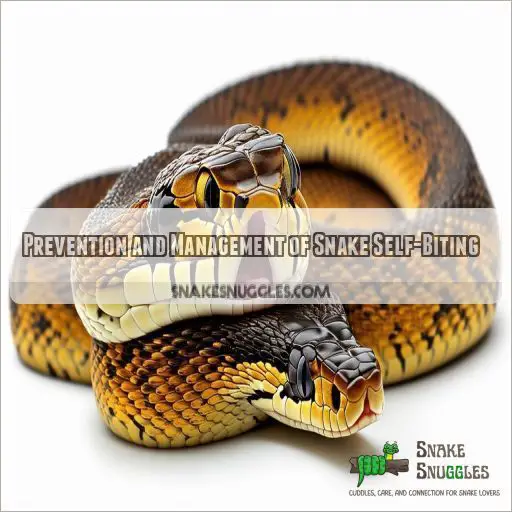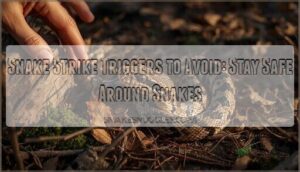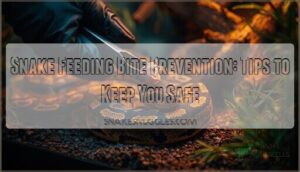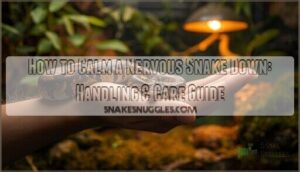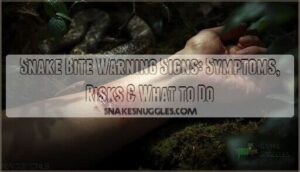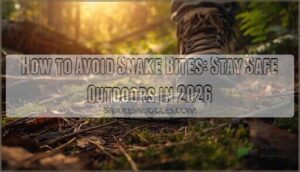This site is supported by our readers. We may earn a commission, at no cost to you, if you purchase through links.

Sometimes, snakes get overexcited, and this can lead to impulsive behaviour, such as biting themselves.
Other times, it could be down to stress and anxiety.
They may also have impaired eyesight, mistaking their own body parts for prey or a threat.
You’ll learn more about why this happens as you read on.
Table Of Contents
- Key Takeaways
- The Occurrence of Self-Biting in Snakes
- Reasons Behind Snakes Biting Themselves
- Understanding Self-Devouring Behavior in Snakes
- Do Snakes Bite Themselves When Injured?
- Prevention and Management of Snake Self-Biting
- Frequently Asked Questions (FAQs)
- Why does a snake eat itself?
- Why do snakes attack?
- Why does a snake bite itself?
- Why do snakes become self-cannibalism?
- How Often Do Snakes Eat Themselves?
- Are There Any Medical Consequences of a Snake Eating Itself?
- Is There Any Way to Identify a Snake That is Likely to Eat Itself?
- Are There Any Snake Species That Are More Likely to Engage in Self-cannibalism?
- Are There Any Other Animals That Engage in Self-cannibalism?
- Why is my snake attacking itself?
- Why does a snake bite itself?
- What does a snake biting itself mean?
- Why do snakes devour themselves?
- What causes snakes to bite themselves?
- How does snake venom work?
- Can snakes poison themselves?
- What should I do if I see this behaviour?
- How can I prevent my snake from self-biting?
- Conclusion
Key Takeaways
- Snakes biting themselves isn’t just an old tale; it happens for a mix of reasons, from stress and anxiety to overexcitement.
- Their poor eyesight can lead to some awkward (and painful) mistakes, mistaking their own body parts for prey.
- It’s not a suicidal act, but rather an accidental or stress-induced behavior, and it’s important to address the root causes to prevent self-harm.
- Understanding these reasons helps us care for these fascinating creatures, ensuring they stay healthy and happy, and don’t become their own worst enemy.
The Occurrence of Self-Biting in Snakes
You might’ve heard tales of snakes biting themselves, and it’s not just an old wives’ tale. This peculiar behavior does occur, and it leaves people wondering: why do they do it? Is it stress? Confusion? Or something else entirely?
It’s not your everyday sight, but snakes have been known to bite themselves. This self-biting behavior can be concerning, especially if it leads to injuries. So, what’s behind this unusual behavior?
While it might seem rare, self-biting in snakes can happen due to various reasons. It could be overexcitement, stress, impaired vision, or even health issues. Finding the cause is key to understanding and stopping this behavior.
Reasons Behind Snakes Biting Themselves
If you’ve ever witnessed a snake biting itself, you’ve probably wondered: Why do they do that? Is it overexcitement, stress, or something else entirely? Let’s explore the reasons behind this intriguing behavior.
There are a number of factors that can lead to snakes biting themselves, ranging from simple excitement to more complex issues like impaired eyesight or underlying health conditions. Understanding these reasons is key to ensuring these fascinating creatures stay healthy.
Overexcitement
You might’ve heard the saying, "a snake eating itself," but why do snakes sometimes exhibit this peculiar behavior? One of the main reasons is overexcitement. When a snake is overly stimulated or excited, it can lead to impulsive actions, including self-biting. Here are some potential causes of overexcitement in snakes:
- Overstimulation from their environment, such as too much handling, loud noises, or bright lights.
- High prey drive, leading to impulsive strikes.
- Young snakes exploring their environment may accidentally bite themselves.
- During breeding season, male snakes can become more aggressive and excitable.
- Hormonal changes impacting a snake’s behavior.
Stress and Anxiety
Stress and anxiety are common triggers for self-biting in snakes. Snakes can experience stress and anxiety just like any other animal, and it can lead to some unusual behaviors.
Imagine you’re feeling a bit frazzled and anxious. You might find yourself biting your nails or pacing back and forth. Well, snakes can exhibit similar behaviors when they’re feeling stressed out.
Self-biting in snakes is often a sign of discomfort or distress. It could be their way of trying to cope with an uncomfortable situation or an unfamiliar environment.
So, if you notice your scaly friend chomping on their own body, it might be time to take a step back and assess their surroundings. Are there any potential stressors lurking about? Maybe their enclosure is a little too cramped, or they’re feeling a bit too warm under those heat lamps.
The key is to identify and address the root cause of their anxiety. It’s like solving a mystery, except the clues are things like hissing, self-biting, and restless slithering.
Impaired Eyesight
Vision problems can also lead to snakes biting themselves.
Snakes have poor eyesight, and when their vision is impaired, they may mistake their own body parts for prey or a threat.
This can result in them accidentally biting themselves.
It’s like when you accidentally bump into a door frame because you didn’t see it; snakes can do the same with their own bodies!
Understanding Self-Devouring Behavior in Snakes
It’s not just overexcitement or stress that can lead to self-biting in snakes. Sometimes, things can take a more sinister turn, and snakes may engage in self-devouring behavior. But why do they do this, and is it a cause for concern?
Here’s what you need to know about this intriguing yet unsettling behavior:
- Cannibalism Risk: Unlike some other animals, snakes don’t typically exhibit cannibalistic tendencies. However, in rare cases, a snake may attempt to eat itself, starting with its tail. This behavior is often driven by confusion or impaired eyesight, causing the snake to mistake its tail for prey.
- Immune System Defense: A snake’s immune system protects it from its venom. When a snake bites itself, its body produces antibodies, neutralizing the venom. This natural defense mechanism has evolved over time.
- Snake Instincts: Self-devouring behavior, though uncommon, can occur when a snake is stressed or threatened. Improper handling, an uncomfortable environment, or illness could be factors. Addressing these issues is important to prevent self-harm.
- Reptile Care: If your pet snake exhibits self-biting or self-devouring behavior, make sure its basic needs are met: a calm, comfortable environment, adequate food and water, and minimal overstimulation. Consult a veterinarian for persistent behavior to rule out medical conditions.
Do Snakes Bite Themselves When Injured?
Now, let’s explore another angle: do snakes bite themselves when they’re injured?
You might’ve heard tales of snakes biting themselves to commit suicide. But, here’s the thing: snakes don’t intentionally harm themselves. They’re not out there plotting their own demise. So, if a snake bites itself, it’s usually due to something else, like the reasons we’ve already talked about: overexcitement, stress, or impaired eyesight.
You see, snakes don’t have the same awareness of pain and injury as we do. They don’t have that voice in their head saying, "Ouch, that hurts! Better not do that again." Their reactions are more instinctual and immediate. So, if a snake is injured, it’s not going to bite itself out of pain or frustration. Instead, it might react by becoming more defensive or trying to hide, but self-biting isn’t typically a response to injury.
Prevention and Management of Snake Self-Biting
So, what can you do to stop these slithery self-attacks? Well, first, you need to figure out why it’s happening. Is your snake stressed or overexcited? Are they confused or having trouble seeing? Maybe they’ve got an injury or illness that’s bothering them.
Here’s a game plan:
- Keep it calm. Reduce overstimulation and provide a chill environment. Think peaceful music, low lights, and a cozy hideout.
- Handle with care. Be gentle and avoid sudden moves. You don’t want to trigger any self-defense mechanisms.
- Food and water. Make sure they’re well-fed and hydrated. A hungry snake might get a little too bite-happy.
- Monitor for stress. Keep an eye out for anxiety signs. A stressed snake might need some alone time or a change in their environment.
- Clean wounds. If your snake does nip themselves, clean those wounds with a reptile-safe disinfectant to prevent infection.
- Vet visits. If the self-biting continues, consult a veterinarian. They can help rule out medical issues and provide treatment.
Frequently Asked Questions (FAQs)
Why does a snake eat itself?
Snakes don’t eat themselves, but they might bite themselves due to stress, confusion, or impaired eyesight. It’s rare for a snake to commit suicide by self-biting, and it’s even rarer for them to ingest their own flesh.
Why do snakes attack?
Snakes can attack for a multitude of reasons, from self-defence to hunting prey. They might even lash out due to confusion or impaired eyesight. But why do they sometimes attack themselves?
Why does a snake bite itself?
A snake might bite itself due to overexcitement, confusion, impaired eyesight, nervous system issues, or underlying medical conditions. If you notice self-biting, clean the wounds and consult a veterinarian.
Why do snakes become self-cannibalism?
Self-cannibalism in snakes is rare and often caused by confusion, impaired eyesight, or high-stress levels. Overheating can increase a snake’s metabolic rate, making it feel hungry when it’s not. Lowering the temperature can help reduce stress and prevent self-cannibalism.
How Often Do Snakes Eat Themselves?
It’s rare for snakes to eat themselves. There are a few reported incidents of snakes biting their tails, but it’s not common in the wild. It’s often due to trauma, stress, or confusion.
Are There Any Medical Consequences of a Snake Eating Itself?
There are medical consequences to a snake eating itself, just like any other animal. If the snake’s body can’t heal itself, it could get infected and even die.
Is There Any Way to Identify a Snake That is Likely to Eat Itself?
Sorry, there are no specific indicators to identify a snake that might eat itself. However, self-harming behaviour in snakes is often linked to stress or discomfort, so keep an eye out for potential triggers.
Are There Any Snake Species That Are More Likely to Engage in Self-cannibalism?
Sorry, no specific species are known to be more prone to self-cannibalism. But, if you spot a snake biting itself, it’s a rare case of possible snake suicide.
Are There Any Other Animals That Engage in Self-cannibalism?
Yes, a few other animals engage in self-cannibalism, including octopuses, praying mantises, hamsters, and sea squirts. Even some tiny organisms like yeasts and worms have been known to self-cannibalise.
Why is my snake attacking itself?
Your snake might be self-biting due to overexcitement, confusion, impaired eyesight, nervous system issues, or underlying medical conditions. If it persists, consult a veterinarian.
Why does a snake bite itself?
Snakes bite themselves for various reasons, including stress, overheating, hunger, confusion, impaired eyesight, or discomfort due to inadequate living conditions or feeding schedules.
What does a snake biting itself mean?
A snake biting itself could mean several things: overexcitement, confusion, impaired eyesight, nervous system issues, or underlying medical conditions. If it persists, consult a veterinarian.
Why do snakes devour themselves?
Snakes don’t exactly "devour" themselves, but they might bite themselves due to stress, discomfort, overexcitement, confusion, or impaired eyesight. It’s like they’re playing a game of snake and ladder, but they’re their own worst enemy.
What causes snakes to bite themselves?
Snakes might bite themselves due to overexcitement, confusion, impaired eyesight, nervous system issues, or underlying medical conditions. It’s a rare form of snake suicide, and the venom must enter the bloodstream to be effective.
How does snake venom work?
Snake venom is a toxic saliva with compounds that immobilise prey and aid digestion. It’s injected by fangs during a bite, dissolving muscle cells and disrupting their function. Some toxins target the nervous or circulatory system.
Can snakes poison themselves?
No, snakes can’t poison themselves with their own venom. They’ve immunity to their own venom. Their venom is only toxic when it gets inside another animal’s blood system.
What should I do if I see this behaviour?
What do you do if your snake is biting itself? First, stay calm. Then, clean the wounds and provide a safe, calm environment. Consult a veterinarian, especially if it persists.
How can I prevent my snake from self-biting?
To prevent self-biting, reduce overstimulation, create a calm environment, make sure your snake has access to food and water, and monitor for stress. Handle your snake gently and avoid sudden movements.
Conclusion
So, why do snakes attack themselves? It’s a curious phenomenon with a mix of causes, from the energetic to the anxious, the visually impaired to the injured. Understanding these reasons helps us better care for these fascinating creatures and make sure they’re healthy. Now you know why your pet snake might be giving itself a nip!

